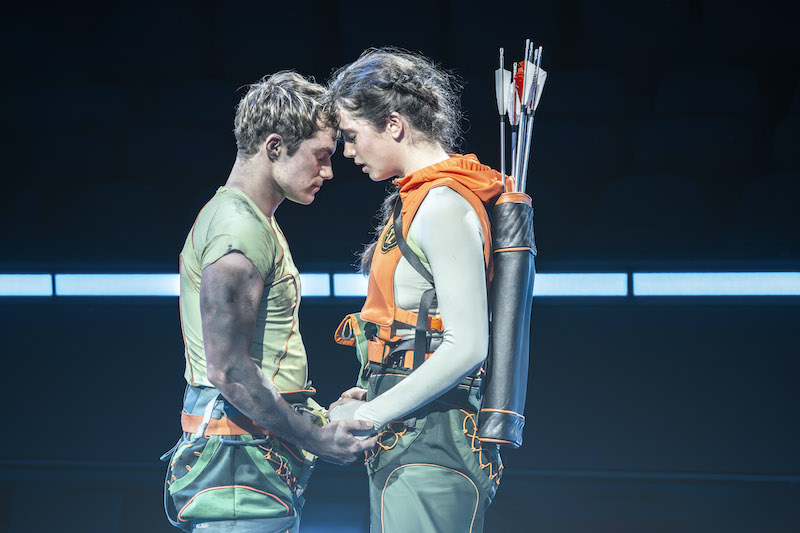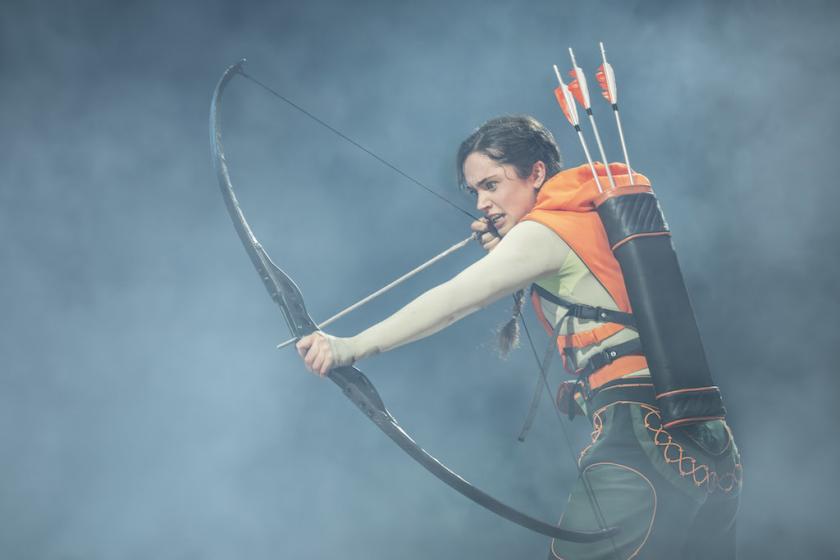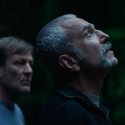As a proposition, this production raises the immediate questions how, and why? While Suzanne Collins’s young adult series of books were logically and successfully adapted for the screen, a futuristic tale involving glittering cities and gladiatorial battles across vast natural terrain hardly seems possible, or even necessary for theatre.
Director Matthew Dunster and his superb production team answer the ‘how’ with dazzling aplomb. Utilising the new, purpose-built Troubadour Canary Wharf Theatre to excellent effect, they have created a show that is a marvel of set and lighting design, choreography and special effects, with a cast whose physical skills wouldn’t be out of place in a dance troupe or even a circus. The worlds we’d expect from our readers’ imaginations, or from seeing them recreated in the films, come alive on stage.
The ’why’ is not addressed so well. For this does feel more like a show than a play; for the most part character is lost amid the sheer scale of the visual enterprise. I was frequently impressed, but rarely really moved.
Playwright Conor McPherson (The Weir, The Girl from the North Country) has based his adaptation on both Collins’s first novel, written in 2008, and on the first film, which rocket-launched Jennifer Lawrence’s career in 2012. The story is set in the futuristic, authoritarian nation of Panem, whose affluent and decadent Capitol subjugates and feeds off 12 impoverished, virtually enslaved districts. Each year, as a reminder of their lot, these districts must provide two youngsters, selected by lottery, to take part in the Hunger Games, a gladiator fight to the death, with one survivor.
Language is a deeply rooted tool of this heinous control, these 24 victims being referred to as ‘tributes,’ the survivor a ‘victor’, and the catchphrase of the Games: ‘may the odds be ever in your favour’. The Capitol is a place of preening, modified pleasure-seekers, lapping it all up as reality TV.

The heroine, Katniss Everdeen (newcomer Mia Carragher) volunteers to take her younger sister’s place, alongside Peeta Mellark (Euan Garrett), a baker’s son; she is a skilled archer and hunter, feisty, independent and resilient; he’s a bit of a loser, secretly in love with her, but quicker to adapt to the ways of the Capitol, in particular the need for the tributes to ingratiate themselves to the filthy rich sponsors who can provide handy items during the Games.
The three worlds of District 12, the Capitol and the verdant arena in which the Games take place are all conjured within the round of the giant new theatre, whose oval stage is surrounded by steep banks of seating giving the space the feel of an arena. At each end, video screens offer everything from forests to futuristic cityscapes, the faces of District 12’s coalminers to that of the despot President Snow (a pre-recorded John Malkovich).
Like McPherson, Dunster’s theatrical CV is dominated by more traditional fare, notably Martin McDonagh’s The Hangmen and The Pillowman, but he clearly has the chops for this kind of spectacle, muscling the action along with verve and imagination. The flexibility of Miriam Buether’s set design is key, allowing the stage to morph between a television studio and a destitute miner’s home, a forest to a sleek train compartment to a state-of-the-art training centre, all with a flick of a switch, while Tal Rosner’s video design fills the large-scale gaps and the close-up snapshots.

Thrilling coups de theatre include the chariot that introduces Katniss and Peeta to the Capitol, which rides through the air shooting fire; and the branches of two giant trees reaching towards each other, also high over the stage, on which Katniss and a sympathetic, much younger competitor, Rue, first meet. The tributes’ training is very well achieved, including climbing and abseiling and, magically, the assurance of every arrow and spear hitting its intended target. And choreographer Charlotte Broom adds an arresting, balletic grace to the violent intent of the Hunger Games themselves, especially the first stage as all 24 set upon each other.
It would be McPherson’s role to retain the human and thematic dimensions within the spectacle. He does manage certain aspects well: the power divide between the Capitol and the districts, the poverty of the districts and the superficiality of the Capitol. But he loses others, notably the frisson of the love triangle between Katniss, Peeta and her beau from home, Gale (Tristan Waterston) who is a largely peripheral figure, and the truly Machiavellian nature of the Games, the sheer politics of the enterprise, which is given scant attention.
His return to the novel’s use of Katniss as the narrator of her own story, though commendable, also feels lust lustre. And the second half, mostly focused on the frenetic action of the Games, displays the weaknesses of the enterprise, the emotional aspect all but lost amid the murder and mayhem.
As the glue of the production, Carragher does well, especially given it’s her stage debut and the physical demands of the role. Around her, though, the evening would have benefitted from more impactful casting – not least because many in the audience will be familiar with the films and the ineffable contributions of Donald Sutherland, Woody Harrelson, Elizbeth Banks and Stanley Tucci.
Here, as the cunning television presenter Caesar Flickerman, Stavros Demetraki could have been so much bigger; as Katniss’s sympathetic stylist (and secret rebel) Cinna, Nathan Ives-Moiba should have been far more subtle; Joshua Lacey’s Haymitch and Tamsin Carroll’s Effie Trinket, respectively the tributes' drunken mentor and airhead attendant, lack the delightful naughtiness of Harrelson and Banks. And as for Malkovich, well, ‘dialling in’ comes to mind; his prerecording, timed to leave space for dialogue with the onstage performers, is so anaemic as to be almost pointless.
But to be fair, Malkovich’s failing is symptomatic of the play’s, because Snow’s presence needs to be so much more substantial, and in the flesh, to accentuate the dystopian horror of its resonant source material.
- The Hunger Games at the Troubadour Canary Wharf Theatre until October 2026
- More theatre reviews on theartsdesk















Add comment